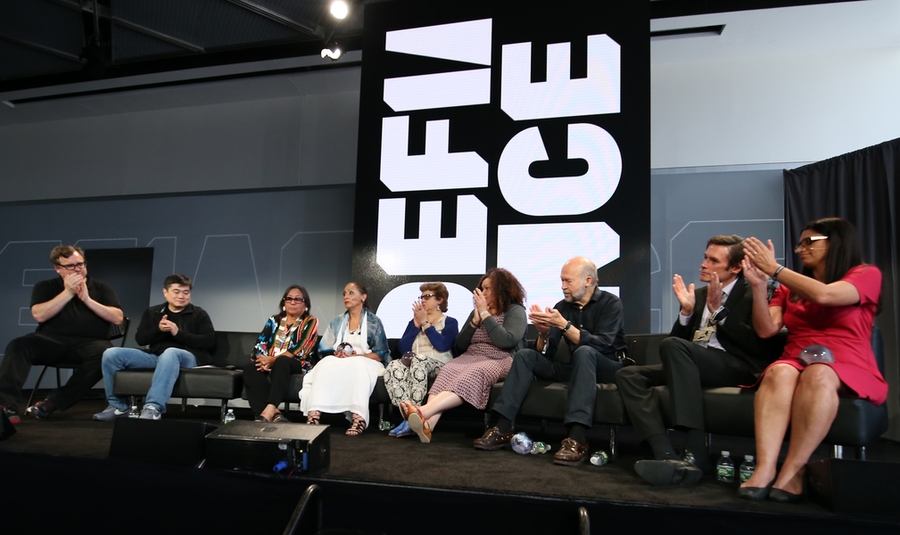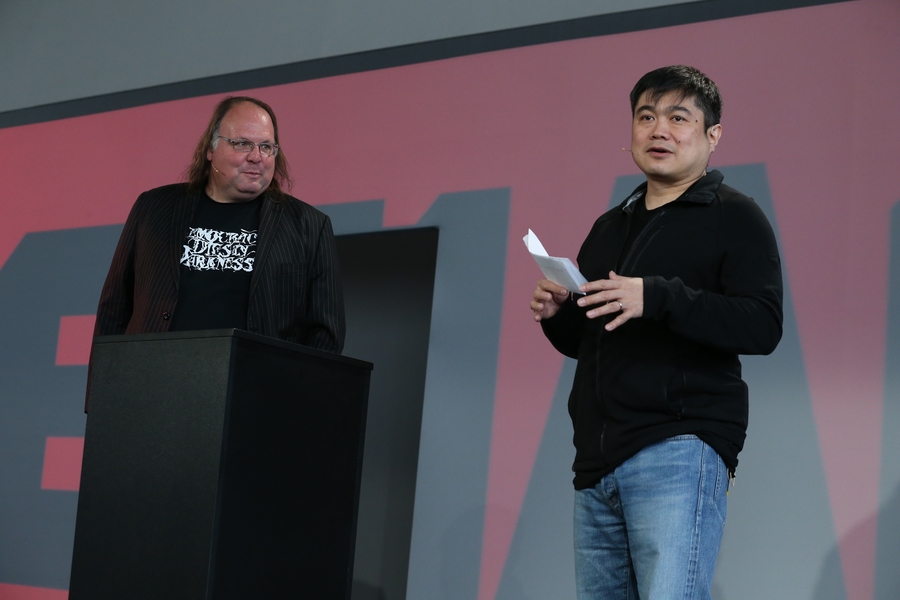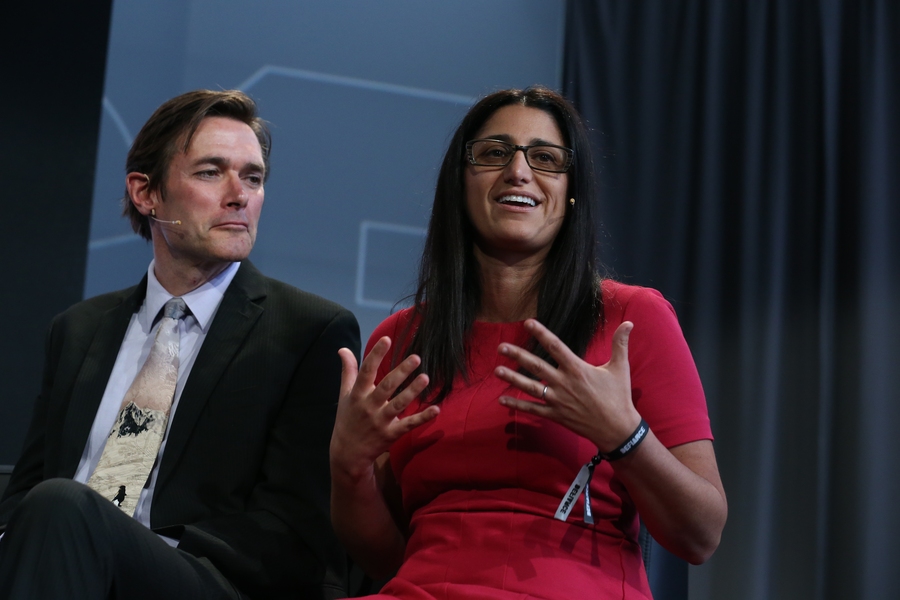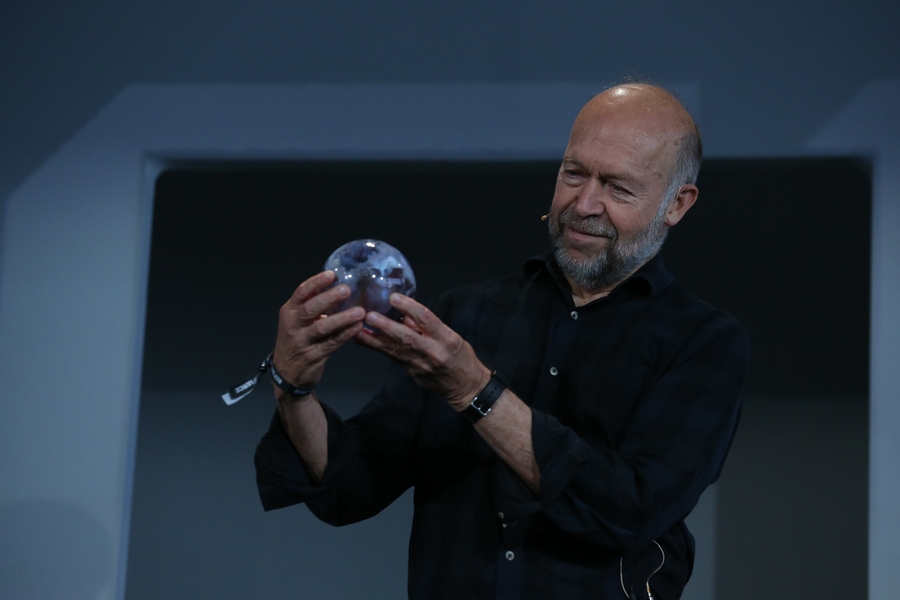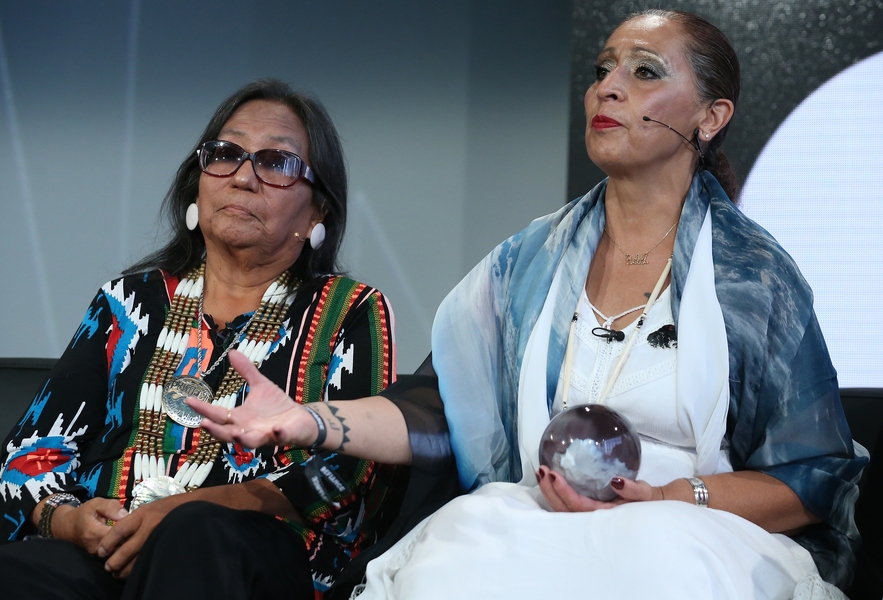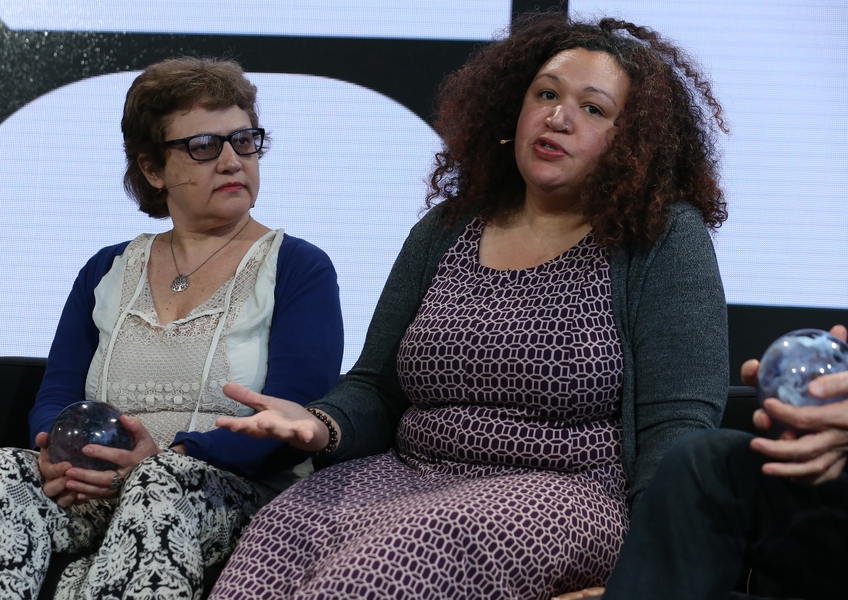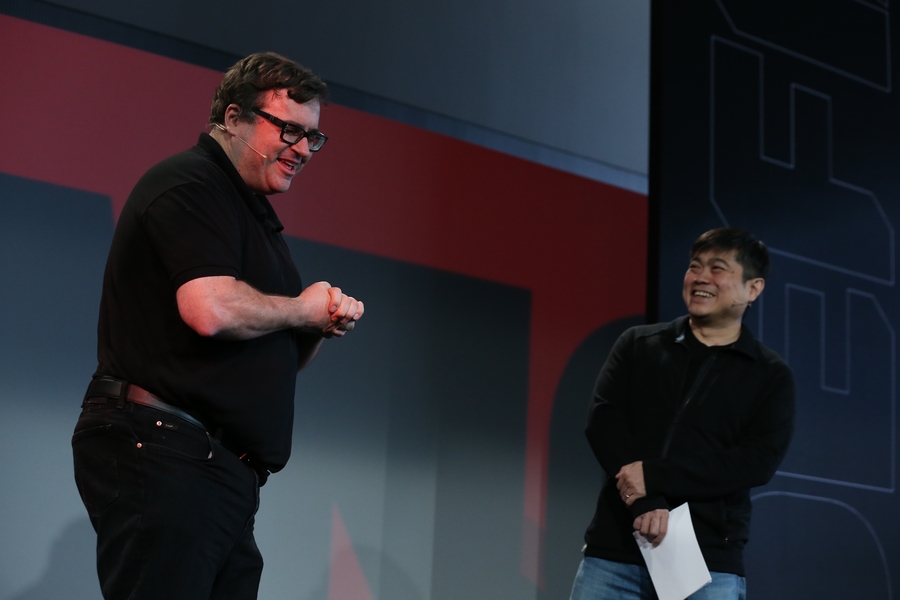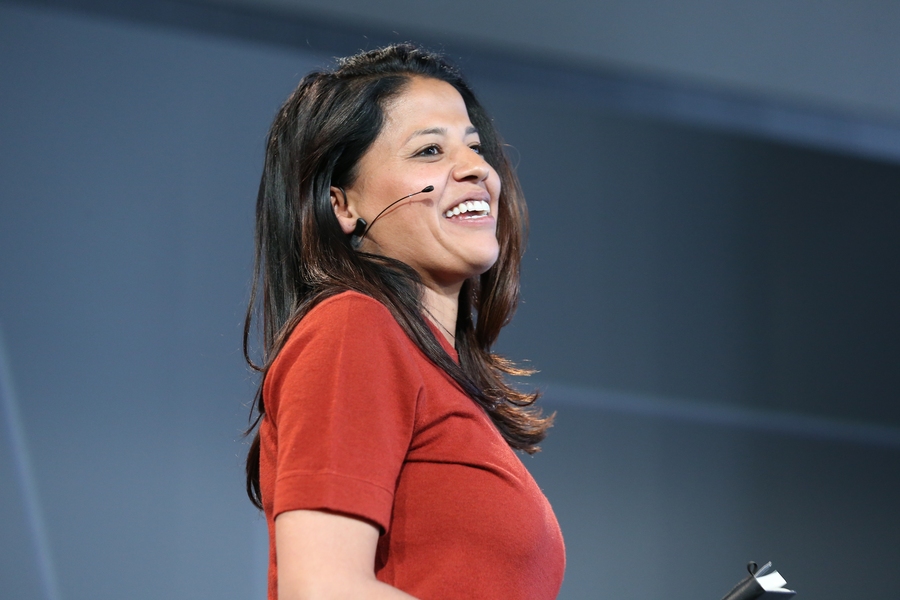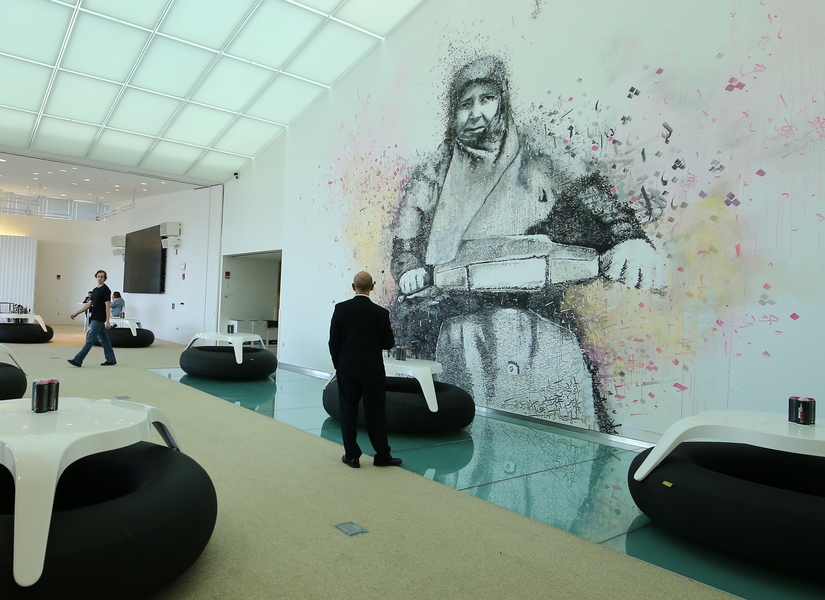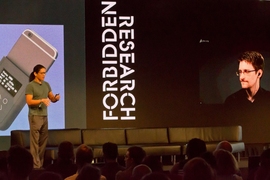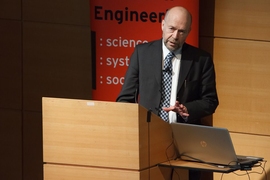The mood was electric at the MIT Media Lab on July 21 when more than 500 people gathered for its annual summer event, this year called Defiance. Attendees were buzzing with news that had broken on the eve of the symposium: The Media Lab had not only chosen the winners of its new Disobedience Award, it had also selected several honorable mentions because the pool of more than 7,800 nominations was so rich with achievements that deserved recognition.
“We wanted to honor the people who found ways to say, ‘The systems aren’t working for us — we really need to step outside them and do something radically different,’” said Ethan Zuckerman, director of the MIT Center for Civic Media and a member of the award selection committee. Zuckerman said that the panel also wanted to recognize those working for good within institutions. “They’re taking brave steps and actions to make sure those institutions live up to their values and to their higher purpose, not just to the rules behind them.”
In selecting the honorees, Zuckerman, Media Lab Director Joi Ito, and 10 other committee members focused on work that impacts society in positive ways, and is consistent with a set of key principles, including nonviolence, creativity, courage, and responsibility for one’s actions. Nominees had to be a living person or group engaged in “extraordinary disobedience for the benefit of society.”
The creation of the award was announced at Forbidden Research, the lab’s 2016 summer event. Reid Hoffman, co-founder of LinkedIn, provided the funds after he and Ito came up with the idea last year. “The prize shines a light on the voices we should be listening to,” Hoffman said at Defiance. “On what examples we should be setting for ourselves and for our future selves. Some of the most important human progress comes when you are essentially speaking truth to power.”
Disobedience Award winners
The committee decided that’s exactly what Michigan pediatrician Mona Hanna-Attisha and Virginia Tech professor of engineering Marc Edwards did in investigating lead-tainted water in Flint, Michigan, and exposing official misconduct in the crisis. Both Hanna-Attisha and Edwards decided to donate their shares of the $250,000 prize to the people of Flint.
“It’s those kids who need these resources,” said Hanna-Attisha. “My activism today is to make sure that we don’t sit back and ignore the consequences of lead exposure. We know what it does to children. My commitment is to turn this around.” Edwards called himself a “serial troublemaker,” having exposed scientific misconduct by federal agencies connected to lead-contaminated water in Washington in 2004. “We were destined to see it repeated, and we knew something like Flint was going to happen. Ultimately, I got a call from a Flint mom who saw all the signs and then we started working with Flint residents so that they could save their own day.” Edwards and Hanna-Attisha persevered in the face of harassment and academic sanctions.
Honorable mentions
James Hansen said his work also got him “in a lot of trouble.” He was one of three award finalists who received a $10,000 honorable mention. Hansen, widely recognized as a pioneer of climate change research, said he’s had “some differences with the scientific community, and I still do. There are many issues where we need to stand up and tell what we think is the truth even if the powers that be don’t like it.”
The co-founders of Freedom University Georgia, which offers free classes and college prep to undocumented students and were also recognized as finalists, faced pressure as well. “Freedom U initially emerged in 2011 as an act of defiance against our employer [the state’s higher education board],” said Lorgia García-Peña. She and three other professors also at the University of Georgia at that time — Betina Kaplan, Bethany Moreton, and Pamela Voekel — established the school in collaboration with a coalition of undocumented students and immigrants’ rights activists. Now one-fifth of Freedom University students win full merit scholarships to traditional colleges.
When he introduced the third finalist to be honored — the Water Protectors of Standing Rock, who launched the massive protest against the Dakota Access Pipeline — Ito pointed out that many successful movements don’t have clear leadership. LaDonna Brave Bull Allard, a member of the Standing Rock Sioux Tribe, said she doesn’t see herself as a leader. “Everything just happened because we stood in prayer and nonviolent resistance.” Allard mesmerized the audience as she related how the Standing Rock protest gained momentum. “It was all the people who came together. It was all the people who understood that water was important. It was all the people of the world who know that we have to change now. And we cannot back down.”
“We have been defiant for 500 years,” said Phyllis Young, a fellow protector of Standing Rock and longtime Lakota activist who shared the honorable mention with Allard, Jasilyn Charger, and Joseph White Eyes. Like Allard, Young also captivated the crowd as she chronicled the history of resistance by her ancestors. “We are the people on the edge,” she said, adding that she’d like to collaborate with MIT.
Young’s wish resonated with Megan Smith ’86, SM ’88, former White House CTO and a member of the Media Lab advisory council. Smith was so moved by the stories of Standing Rock that, together with MIT’s Vice President for Research Maria Zuber, she suggested a Dakota-MIT summit on green energy. That announcement drew loud applause, especially when Young said “Yes, we could coordinate with the brass ring.”
A nod to the past
“Defiance is a celebration of the highest instance in human nature,” said the event’s emcee, Farai Chidaya. The veteran journalist and analyst, who recently joined the Media Lab as a Director’s Fellow, said that defiant work allows us “to transcend unjust rules and restrictions, and to surface the love of humanity in ways that are brave and risky.”
Another new Director’s Fellow, Jamila Raqib, picked up on that theme. She’s executive director of the Albert Einstein Institution and a Nobel Prize nominee in the peace category. The Einstein Institution is based on the legendary physicist’s belief, said Raqib, “that strategically applied nonviolent defiance offers humanity the best hope for bringing about a world with more peace and justice.”
Past achievements laid the groundwork for the Disobedience Award winners and finalists, stressed another speaker, Gregg Pascal Zachary, author and Arizona State University professor. “Your legitimacy as rebels and dissenters today in part depends upon the legitimacy gained by dissenters and rebels. History can show you patterns, how they play out, so you can anticipate what you might face in your struggle.” Fellow presenter Julia Reda agreed. She represents the European Pirate Party, a movement to defend freedoms online, and said that progress will only happen “if somebody has planted the seed for change of thinking in society. This is what defiant people actually do.” Reda went on to talk about her unconventional path to politics, as an outsider now making the most of having “a seat at the table.”
Echoing that sentiment was Ed You, a supervisory special agent in the FBI’s Biological Countermeasures Unit. He thinks the agency would benefit from bringing biohackers to the table as well. “What a fantastic act of defiance that would be. Members of the hacker community can come up with solutions for the FBI, and it’s important for everyone to push their comfort level.” Adam Foss, a former prosecutor who is working to reform the criminal justice system, also talked about bringing more people — and greater diversity — to the table. Foss told the audience that “the seats in this room that are not filled could be representative of black and brown bodies that could be here sharing their ideas. The lack of those ideas is impacting all of us.”
Engagement with other people is critical, said journalist and author Masha Gessen. “It is really important to talk with people who affirm your reality. But if that’s all you’re getting, then you’re not actually engaging with reality. I think we have to accept a level of discomfort for ourselves, too.”
Giving voice to underrepresented people
Esra’a Al Shafei, another Defiance speaker, is a Bahraini activist and founder of Majal.org, a network of online platforms that amplify marginalized voices. “Defiance goes beyond dissent,” she said. “It’s creating avenues for self-expression. If you keep lowering the barriers through music, for instance, it makes censorship much harder, and encourages young people to develop their own identity and feel more in charge of their own voices.” Speaking of music, Al Shafei somehow found a way to weave singers Céline Dion and Meatloaf into her presentation, cracking up the audience throughout her time on the stage. Jose Antonio Vargas also had them laughing. “Humor is so important,” the Pulitzer Prize-winning journalist, filmmaker, and media entrepreneur said. “If I didn’t laugh about my own circumstances, I don’t know where I’d be.” He shared the stories of his life as an undocumented immigrant in the U.S., his home for almost 24 years. “The reality now though is when you have privilege like I did, like I do, is … what are you doing to risk it? What does it mean to stand up for your undocumented neighbors, classmates, and co-workers?”
While Vargas focused on issues of today, the next session again drew from examples of defiance in history, and also considered the tensions between science and faith. In a discussion between Dominican priest Eric Salobir and Maria Zuber, moderated by Berkman Klein Center co-founder and Harvard Law Professor Jonathan Zittrain, Zuber said that “we should always be looking at what the data is telling us. If it tells us we should change our idea, then we should change our idea. In the process of change, one thing to learn is having a good enough dialogue and trying to get enough explanations that you can get buy-in to allow change to proceed.”
The audacity of disobedience
Lab director Joi Ito gave a special shout-out to Zuber. She took a risk, he said, in being part of the Disobedience Award selection committee, because she has a position on the National Science Board, which is an advisory body to the U.S. President and Congress. But Ito said that the committee was “very careful to not allow fear or lack of courage to enter the selection process. We were checking each other to make sure there was no kowtowing.” In the end, he said, they were all pleased with their choices.
Reid Hoffman agreed, and announced that he would continue to fund the Disobedience Award. “These are the things that matter. These are the issues that we should surface. This is the light we should point this beacon at. This was a well-validated ‘seed experiment’ that was totally awesome.”
